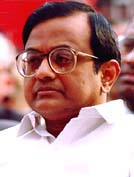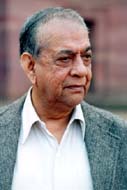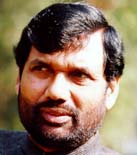Capital Buzz/Virendra Kapoor
Two Aiyars, one Chettiar
 Federal Finance Minister P Chidambaram has always been sensitive
about his public image. Given his wide contacts with the newspaper
barons and his excellent academic background, he invariably gets
good press.
Federal Finance Minister P Chidambaram has always been sensitive
about his public image. Given his wide contacts with the newspaper
barons and his excellent academic background, he invariably gets
good press.
But, of late, he has been worried about the mounting criticism
resulting from the sharp downturn in the economy. What really
nettled him, though, is the accusation that he is softpedalling
the Indian Bank scam. Since leading Tamil Maanila Congress members
are beneficiaries of the largesse distributed by the bank, which
declared losses of over Rs 13 billion last year, Chidambaram finds
it hard to shake off the charge.
Adding to his woes are two articulate and equally well-educated
Tamilians - namely Subramanian Swamy of the Janata Party and Mani
Shankar Aiyar of the Congress. They are using the Indian Bank
scam to rip Chidambaram's reputation apart.
The two Aiyars do not have much in common. Nor do they get along
with each other but, in Chidambaram, they have found a common
target. No wonder the Chettiar leader is running scared.
A few days ago, his office issued a circular asking finance ministry
officials to direct any query from the prime minister's office
to the finance minister's notice within 24 hours. The directive
applies even to telephonic messages from the PMO.
This has, no doubt, has made the task of senior finance ministry
officials cumbersome for, on a routine working day, the PMO contacts
them for all manner of things on the restricted official telephone
exchange.
TMC leaders suspect that the AIADMK supremo, J Jayalalitha, is
exploiting her old connections with Prime Minister Deve Gowda's
sons to get at Chidambaram and his leader G K Moopanar. And that
the Indian Bank scam has come handy for them to put the TMC down.
Meanwhile, a senior official inducted into the finance ministry
is informally monitoring adverse media reports against Chidambaram.
A very correct judge
Supreme Court Justice Kuldip Singh, who retired on the last day
of 1996, took only one day to vacate his official bungalow in
the capital. The `green judge', who took judicial activism to
new heights in the larger interest of the people, did not want
to avail of even the one-month grace period customarily allowed
to the occupants of official houses.
He left for Chandigarh determined to set new norms for retired
judges. He would do neither chamber practice nor arbitration work.
Both these are big sources of income for retired high court and
Supreme Court judges.
However, in the country-wide seminar and Rotary Club circuit,
Justice Kuldip Singh may well pose a big challenge to that old
favourite, retired chief election commissioner T N Seshan. Who,
in the meanwhile, is considering canvassing for friendly politicians'
support in his attempt to become the next vice-president of India.
Gupta's objective test
 Federal Home Minister Indrajit Gupta shows all the signs of advanced
age. He is easily irritable, dozes off amidst earth-shaking discussions
and often has difficulty remembering names of senior bureaucrats.
But, nonetheless, he has not lost any of his passion for political
rectitude. He is blunt, to the point of being rude, with hangers-on
and lobbyists seeking favours.
Federal Home Minister Indrajit Gupta shows all the signs of advanced
age. He is easily irritable, dozes off amidst earth-shaking discussions
and often has difficulty remembering names of senior bureaucrats.
But, nonetheless, he has not lost any of his passion for political
rectitude. He is blunt, to the point of being rude, with hangers-on
and lobbyists seeking favours.
The other day someone approached him, canvassing for governorship
for a retired bureaucrat. Gupta put him through his usual test
in these matters. The interlocutor was asked to answer the three
questions - whether the gubernatorial aspirant had ever been close
to the controversial godman Chandra Swami; whether he was close
to former prime minister Narasimha Rao; and whether he enjoyed
a reputation for financial honesty.
The candidate failed the test because at one time he was known
to be pretty close to the Congress leaders.
Keeping Doordarshan door
Even hardcore socialists accord the public sector step-motherly
treatment.
For example, the avowed claim of the ruling United Front government
is to strengthen the state-owned Doordarshan so that it can repulse
the challenge of the myriad private foreign and Indian-owned satellite
television channels. But, at a pinch, the UF ministers would rather bestow
a favour on private channels than on Doordarshan. Their logic
being that they need to win over the private channels whereas
the state-owned Doordarshan can always be ordered to do their
bidding.
Thus, when Railway Minister Ram Vilas Paswan flew to Assam the
other day to visit the site of the Brahmaputra Mail blast, he
shooed off the Doordarshan crew and, instead, selected the camera
teams of two private television software production houses to fly with
him gratis in the special aircraft.
 One does the high profile news programme for a Hong Kong-based
satellite channel, whereas the other hawks footage to whoever
pays it the highest price, including Doordarshan. The latter's
owner, incidentally, has a matrimonial connection with a former
information officer of the government of India and, therefore,
manages to get vintage slots on all such newsworthy occasions,
courtesy the official media.
One does the high profile news programme for a Hong Kong-based
satellite channel, whereas the other hawks footage to whoever
pays it the highest price, including Doordarshan. The latter's
owner, incidentally, has a matrimonial connection with a former
information officer of the government of India and, therefore,
manages to get vintage slots on all such newsworthy occasions,
courtesy the official media.
Earlier, when two commercial aircraft collided over Dadri in Haryana,
Minister for Civil Aviation C M Ibrahim refused to take the Doordarshan
crew with him. This, when he doubles as the information and broadcasting
minister and is, in that position, committed to blunt the challenge
of the foreign satellite channels. The other private software
trading house piggybacked on the plane of no other than the prime
minister himself.
So much for the UF's commitment to defend and strengthen Doordarshan.
Posted in London, seen in Delhi
India's high profile high commissioner in London, L M Singhvi,
knows how to keep everyone happy.
Appointed by the short-lived Chandra Shekhar government, he has
survived three regimes since then and is firmly ensconced in his
job even after his regular tenure came to end some time ago.
Singhvi now aspires to be the consensus candidate for the vice-president's
office. Considering the red carpet that he rolls out for all Indian
VIPs visiting London, it should not come as a surprise if he gets
the support of senior politicians cutting across party lines.
He was in the capital recently and met a clutch of senior politicians.
Indeed, some are beginning to question the reason for his frequent
trips to New Delhi. No other serving high commissioner in London
has visited India as often as Singhvi has in recent years. Who
picks up the tab and why?
|





 Federal Finance Minister P Chidambaram has always been sensitive
about his public image. Given his wide contacts with the newspaper
barons and his excellent academic background, he invariably gets
good press.
Federal Finance Minister P Chidambaram has always been sensitive
about his public image. Given his wide contacts with the newspaper
barons and his excellent academic background, he invariably gets
good press.
 Federal Home Minister Indrajit Gupta shows all the signs of advanced
age. He is easily irritable, dozes off amidst earth-shaking discussions
and often has difficulty remembering names of senior bureaucrats.
But, nonetheless, he has not lost any of his passion for political
rectitude. He is blunt, to the point of being rude, with hangers-on
and lobbyists seeking favours.
Federal Home Minister Indrajit Gupta shows all the signs of advanced
age. He is easily irritable, dozes off amidst earth-shaking discussions
and often has difficulty remembering names of senior bureaucrats.
But, nonetheless, he has not lost any of his passion for political
rectitude. He is blunt, to the point of being rude, with hangers-on
and lobbyists seeking favours.
 One does the high profile news programme for a Hong Kong-based
satellite channel, whereas the other hawks footage to whoever
pays it the highest price, including Doordarshan. The latter's
owner, incidentally, has a matrimonial connection with a former
information officer of the government of India and, therefore,
manages to get vintage slots on all such newsworthy occasions,
courtesy the official media.
One does the high profile news programme for a Hong Kong-based
satellite channel, whereas the other hawks footage to whoever
pays it the highest price, including Doordarshan. The latter's
owner, incidentally, has a matrimonial connection with a former
information officer of the government of India and, therefore,
manages to get vintage slots on all such newsworthy occasions,
courtesy the official media.